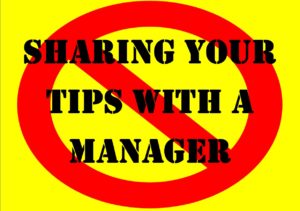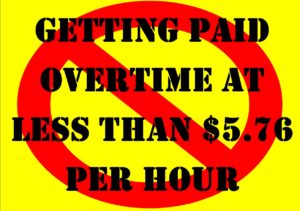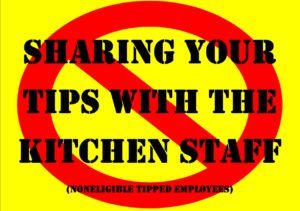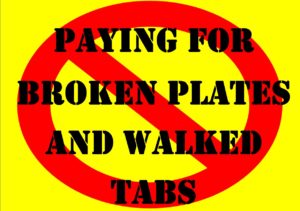Tips, Tip Credit, and Tipped Employees
Lots of hardworking employees receive tips as part of their compensation, often receiving more in tips from their customers than they do from their employers. If an employer follows the law, it can claim a certain portion of the tips a tipped employee receives against the wages it must pay its employees. This is known as the “tip credit.” Under federal law, currently an employer can claim up to $5.12 per hour against the wages it is required to pay its employees. This means that an employer is permitted to pay a tipped employee, such as a server or a bartender, as little as $2.13 an hour. Of course, an employer cannot simply elect to use the tip credit to pay a tipped employee as little as possible. Unfortunately, employers often try to cheat their employees of wages even when they are already only paying them $2.13 an hour.
Here are some violations committed by restaurants




To use the tip credit, an employer must meet a series of strict requirements.
![]()
The employer must inform its employees of its intent to use the tip credit. Typically when new employees are hired, the employer explains to its employees either orally or in writing that it intends to claim the tip credit. If your employer did not do this or simply told you that you would be paid like all other servers, your employer might be in violation of the law.
![]()
The employer must actually pay at least $2.13 cents an hour. To pay a tipped employee on the tip credit, an employer must actually pay its tipped employee at least $2.13 an hour. If an employer is paying its employee nothing and instead requiring its employees to only rely on tips from its customers, that employer is likely violating the law. Likewise, if an employer makes deductions from a tipped employee’s compensation, such as for accidently breaking glassware or when a customer leaves without paying, the employer is likely violating the law.
![]() The amount claimed as a tip credit cannot exceed the amount of tips an employee actually receives. The tip credit is designed to ensure that the cash wages paid by an employer plus the amount of tips the tipped employee receive is still equal to at least the minimum wage. Accordingly, if during a weekly pay period, an employee does not make at least $5.12 an hour in tips, an employer cannot claim the full tip credit. Likewise, if the amount of the cash wage paid by the employer together with the amount of tips an employee receives during a week is less than the minimum wage (i.e., $7.25 times the number of hours worked that week), the employer has to make up the difference.
The amount claimed as a tip credit cannot exceed the amount of tips an employee actually receives. The tip credit is designed to ensure that the cash wages paid by an employer plus the amount of tips the tipped employee receive is still equal to at least the minimum wage. Accordingly, if during a weekly pay period, an employee does not make at least $5.12 an hour in tips, an employer cannot claim the full tip credit. Likewise, if the amount of the cash wage paid by the employer together with the amount of tips an employee receives during a week is less than the minimum wage (i.e., $7.25 times the number of hours worked that week), the employer has to make up the difference.
![]() Tips are property of the employee that receives them. A tip is the sole property of the tipped employee. This is true whether the employer takes a tip credit or not. Tipped employees can be required to participate in a tip pool to share their tips with other tipped employees, however, tipped employees cannot be required to share their tips with management, their restaurant, or back-of-the-house employees such as cooks or dishwashers. If your employer is requiring you to participate in an invalid tip pool, your employer is breaking the law.
Tips are property of the employee that receives them. A tip is the sole property of the tipped employee. This is true whether the employer takes a tip credit or not. Tipped employees can be required to participate in a tip pool to share their tips with other tipped employees, however, tipped employees cannot be required to share their tips with management, their restaurant, or back-of-the-house employees such as cooks or dishwashers. If your employer is requiring you to participate in an invalid tip pool, your employer is breaking the law.
![]() Employees paid with the tip credit must perform work that generates tips. An employer cannot just decide that it wants to pay its employees $2.13 an hour instead of the normal minimum wage. Instead, to take advantage of the tip credit, an employer’s employees must perform work that generates tips and must perform work that generates tips most of the time. In general, tipped work is customer facing work, not cleaning, stocking shelves in the storeroom, or cooking. If your employer pays you with the tip credit, but most of your work is not tip generating, your employer may be breaking the law.
Employees paid with the tip credit must perform work that generates tips. An employer cannot just decide that it wants to pay its employees $2.13 an hour instead of the normal minimum wage. Instead, to take advantage of the tip credit, an employer’s employees must perform work that generates tips and must perform work that generates tips most of the time. In general, tipped work is customer facing work, not cleaning, stocking shelves in the storeroom, or cooking. If your employer pays you with the tip credit, but most of your work is not tip generating, your employer may be breaking the law.
How Does Overtime Work For Tipped Employees?
Like most other employees, most tipped employees are entitled to receive overtime compensation when they work more than 40 hours a week. Under the law, overtime is 1.5 times an employee’s hourly rate. However, for a tipped employee, this does not mean that his or her overtime rate is $2.13 an hour times 1.5. The largest tip credit an employer can claim is $5.12 an hour and that rule applies to overtime and non-overtime hours alike. That means for every overtime hour, an employer must pay 1.5 times the minimum wage, or $10.88 an hour and then can claim the hourly tip credit of $5.12 an hour. Therefore, for every overtime hour that a tipped employee works, he or she must be paid at least $5.76 an hour. If an employer of a tipped employee is not paying at least $5.76 an hour for overtime, it is breaking the law.
How Do Employers Break The Law For Tipped Employees?
Employers break the law for tipped employees in a lot of different ways. The most common being:
- Requiring tipped employees to share tips with non-tipped employees, such as management, expeditors, or other back-of-the-house employees
- Requiring tipped employees to engage in work that does not generate tips, such as cleaning, stocking shelves, or performing a substantial amount of side work
- Taking tips from the tipped employees. If management takes tips, management may be breaking the law. This is true even if management takes tips indirectly, such as by making servers pay for broken dishes.
- Requiring tipped employees to pay an excessive amount to receive tips from credit cards. If a customer leaves a tip with a credit card and the employer must pay the credit company a percentage on each sale, the employer can deduct that percentage—and only that percentage—from the employee’s tips. For example, if the credit card company charges 3% to process a sale but the restaurant deducts 4% to process the credit card tips, the employer may be breaking the law.
- Not paying the correct amount of overtime
- Not paying their employees for all hours worked, such as by not permitting employees to clock in before their first table of a shift arrives
What Could You Be Owed If Your Employer Broke the Law For Tipped Employees?
If an employer does not comply with the law for tipped employees, it must pay its employees the minimum wage for every hour they worked and may be subject to a penalty equal the amount of unpaid wages. If an employer violates the tip credit rules, it loses its entitlement to take advantage of the tip credit and must repay that money to its employees. In other words, if an employer took the full tip credit of $5.12 an hour but broke the law in doing so, it would be required to pay its employees $5.12 an hour for each hour they worked during the applicable statute of limitations.
If you have questions about how your employer is paying you tips or think your employer might be violating the law, please give contact the attorneys at Sosa-Morris Neuman and we would be happy to help you explore your options.
Follow us on Facebook
Contact Us
The information on this website is not, nor should it be, construed as legal advice for any reason, individual, or legal matter. The information on this website is for general and educational information purposes only. The information on this website is not intended to create an attorney-client relationship. All cases and legal matters are different. If you have a legal question, contact us for a free and confidential case evaluation. ©2017 Sosa-Morris Neuman Attorneys at Law. All Rights Reserved.
